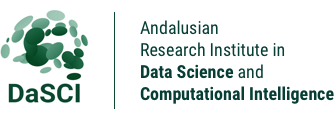The International Summer School organised by the University of Granada and ADIA Lab will shape the future of safe and reliable AI
17 July, 2024
- An article published by DaSCI researchers four years ago on the same topic of the summer school has now reached more than 7,200 citations, which is a great impact in its field.
- More than fifty researchers from all over the world attend the international summer school, where some of the most prominent figures of the moment are giving lectures.
The city of Granada welcomes experts and students from all over the world to the International Summer School organised by ADIA Lab and the University of Granada with the theme Trustworthy, Safe, and Governable AI. The course was inaugurated by Manuel González Bedia, Director General of Strategic Planning for Digital Transformation, Enrique Herrera-Viedma, Vice Rector for Research and Transfer, Francisco Herrera, Director of DaSCI, professor at the UGR and PI of the INCIBE project in which these conferences are framed, and Abdulla AlKetbi, President of the ADIA Lab Operations Council.
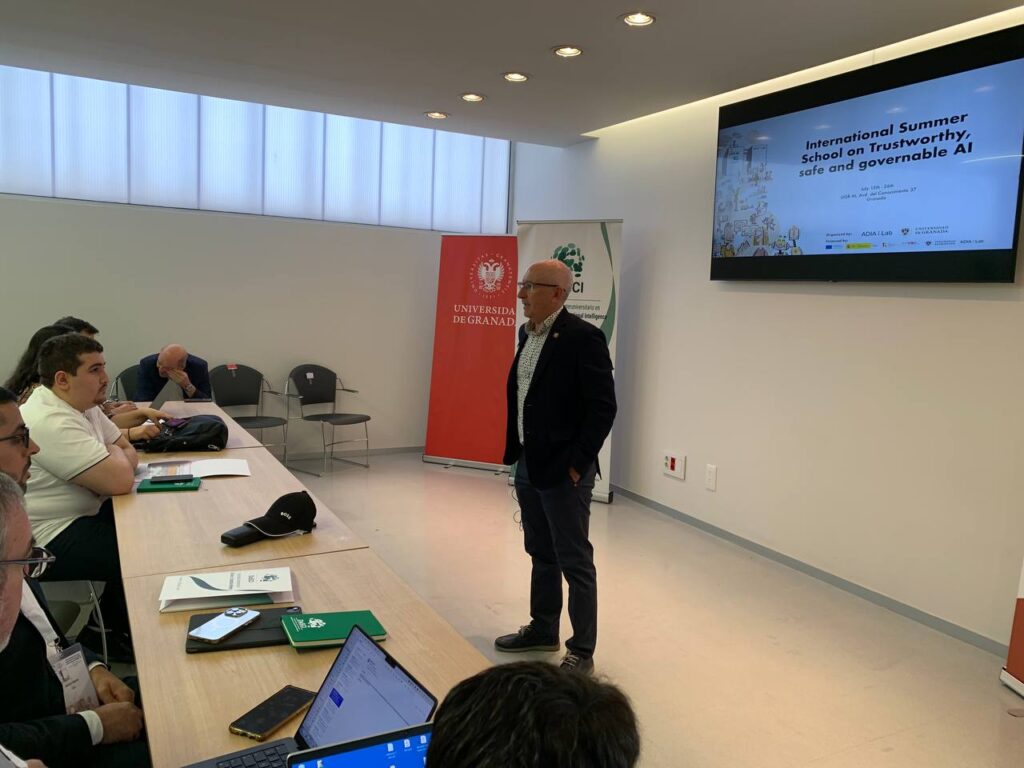
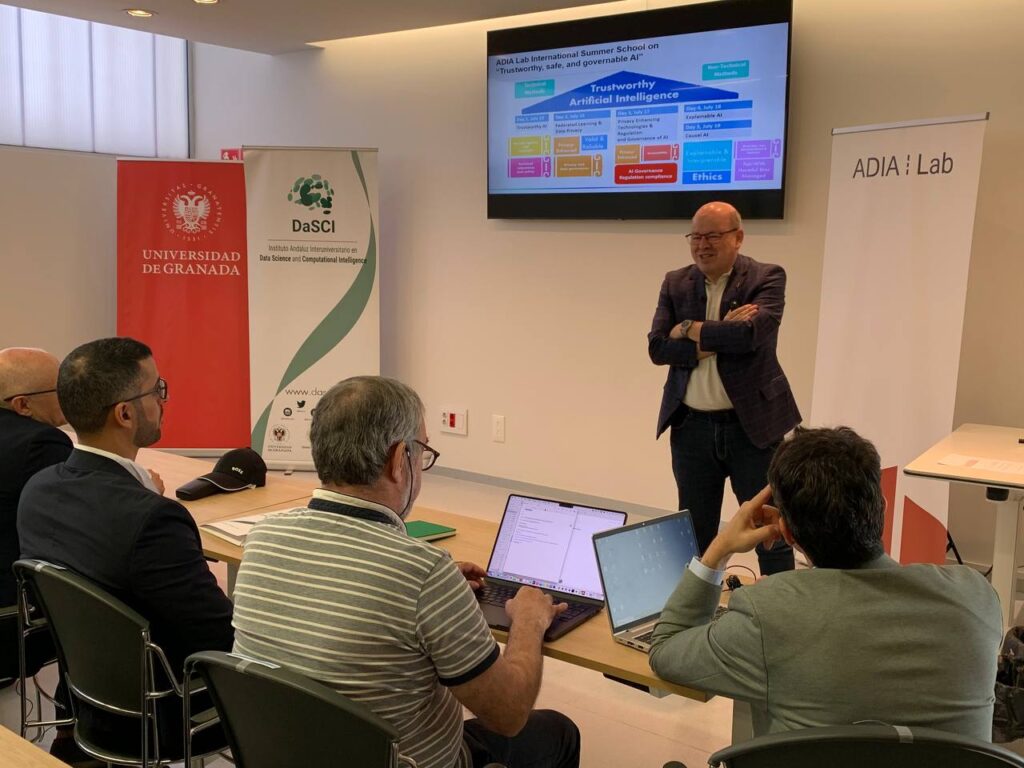
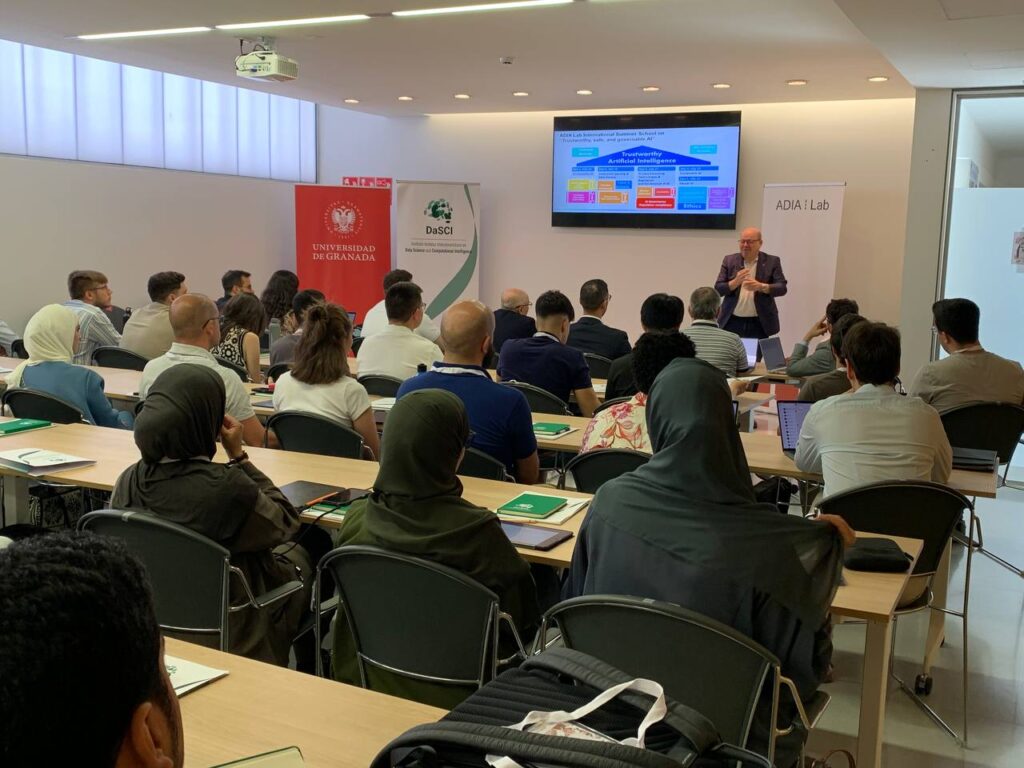
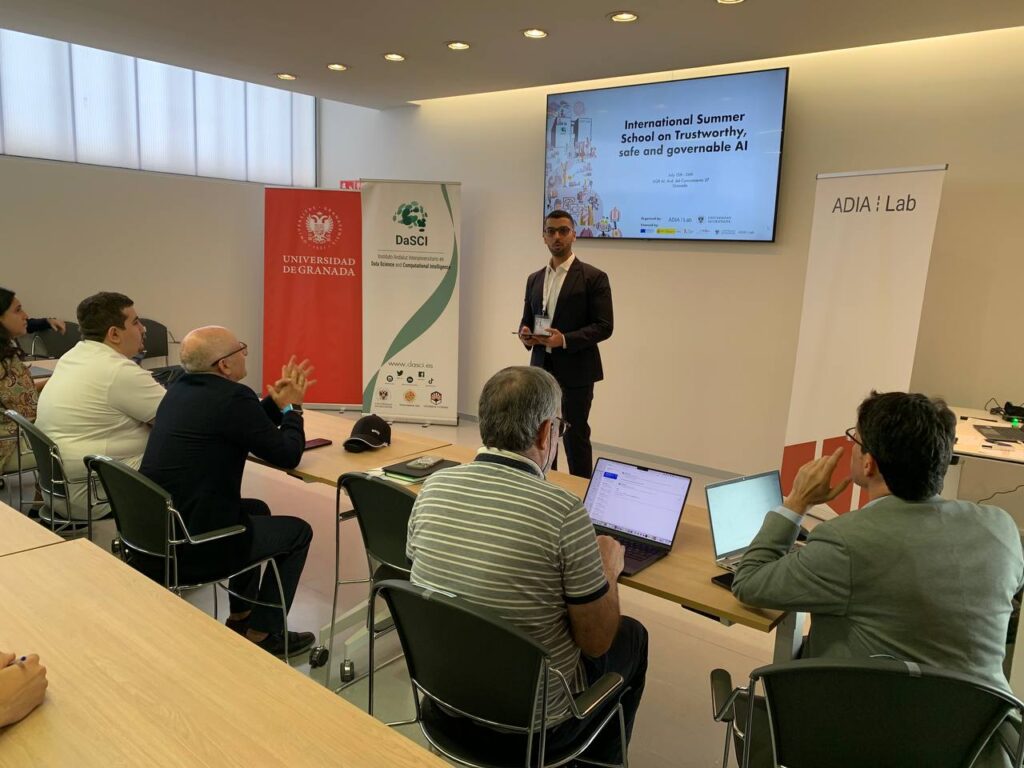
The summer school, which runs until 26 July, will address the challenges and opportunities in the field of explainable AI (XAI), an area that has become increasingly relevant in recent years. The growing interest in the subject is reflected in the number of citations and the attention received by articles in this area, such as the article Explainable Artificial Intelligence (XAI): Concepts, Taxonomies, Opportunities and Challenges toward Responsible AI, published four years ago by the team of researchers from Granada, led by Francisco Herrera, which has been a benchmark in this field, accumulating more than 7,200 citations to date.
The lectures will be held in the recently opened UGR IA building located in the Granada Health Technology Park, which is also the headquarters of the Andalusian Inter-University Institute in Data Science and Computational Intelligence and the AI Granada Foundation. The summer school is attended by more than 50 students from all over the world (17 from the United Arab Emirates, 11 from the University of Granada and the rest from places as diverse as the Universities of Deusto, Pablo de Olavide, Córdoba, Jaén, Politécnica de Madrid, Oberta de Catalunya, País Vasco or Navarra within Spain, and from Zurich, Cincinnati, Dakota, Coimbra or El Valle Colombia outside our country).
Programme and Objectives
The summer school programme will include keynote lectures, hands-on workshops and networking sessions, with the participation of leading researchers and industry professionals. Attendees will have the opportunity to explore topics such as the principles of trust and safety in AI, bias detection and mitigation, as well as ethical considerations in AI, the importance of explainability in AI systems, advanced topics in generative AI and their implications for trust as well as privacy and data governance and AI regulation.
Speakers include Francisco Herrera, Carme Artigas, co-chair of the United Nations Advisory Body on Artificial Intelligence and former Secretary of State for Digitalisation and Artificial Intelligence, Merouane Debbah, director of the 6G Research Centre, Computer and Communications Engineering at the Khalifa University of Science and Technology in Abu Dhabi (UAE) and Shafi Goldwasser, director of the Simons Institute for Computational Theory at UC Berkeley (USA), among others. The industrial sector will also be present with representatives from Minsait, Adigital, Google, Repsol, CausaLens, Nazaries and Thales.
UGR and Granada, epicentre of AI this summer
‘This Summer School is a crucial step in fostering international research on AI. Ensuring trust and security in AI systems is essential as they affect critical areas of our lives. This event brings together experts from around the world to explore the ethical, technical and social dimensions of AI, equipping participants with the tools they need to develop responsible AI technologies that benefit society,’ says Horst Simon, Director of ADIA Lab.
‘Building trust in AI models starts with understanding them, which makes explainable AI crucial. The ADIA Lab Summer School in Trustworthy AI, in collaboration with the University of Granada, offers a unique opportunity to learn from leading experts and gain hands-on experience in explainable and ethical AI’ says Chairman of the Board of Operations ADIA Lab.
Enrique Herrera-Viedma, Vice Rector for Research and Transfer, highlighted the role of Granada and its University in research and transfer of AI to society, especially in the research and teaching hub that is the Granada Health Technology Park.
For his part, Francisco Herrera stressed: ‘Granada becomes the epicentre of AI this summer, and we are proud to host such a relevant and necessary event in the current context’.
The Andalusian Inter-University Institute in Data Science and Computational Intelligence, known as DaSCI, is a collaborative entity between the universities of Granada, Jaén and Córdoba. It is dedicated to advanced research and training in the field of Artificial Intelligence, with a particular focus on Data Science and Computational Intelligence. The institute brings together an outstanding group of researchers working on joint projects, promoting the development and application of innovative technologies in various sectors. With the aim of becoming a benchmark in its field, the DaSCI promotes the transfer of scientific knowledge to the socio-economic environment, thus contributing to technological progress and the digitisation of industry. https://dasci.es/es/
This summer school is part of the Collaboration Agreement between the University of Granada and the S.M.E. INSTITUTO NACIONAL DE CIBERSEGURIDAD DE ESPAÑA M.P., S.A. FOR THE PROMOTION OF STRATEGIC CYBER SECURITY PROJECTS IN SPAIN, financed by ADIA Lab and the S.M.E. INSTITUTO NACIONAL DE CIBERSEGURIDAD DE ESPAÑA M.P., S.A. (hereinafter ‘INCIBE’) and by the European Union NextGenerationEU.

#ProyectosCiber
#PlanDeRecuperación #NextGenerationEU
More information:
– Explainable Artificial Intelligence (XAI): Concepts, Taxonomies, Opportunities and Challenges toward Responsible AI. Alejandro Barredo Arrieta, Natalia Díaz-Rodríguez, Javier Del Ser, Adrien Bennetot, Siham Tabik, Alberto Barbado, Salvador García, Sergio Gil-López, Daniel Molina, Richard Benjamins, Raja Chatila, Francisco Herrera . Information Fusion (2020). https://doi.org/10.1016/j.inffus.2019.12.012


